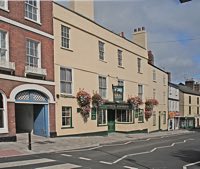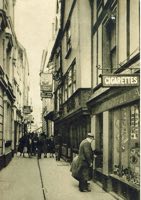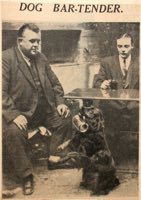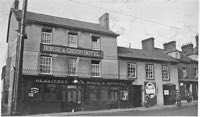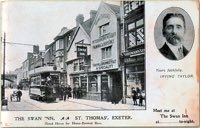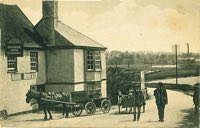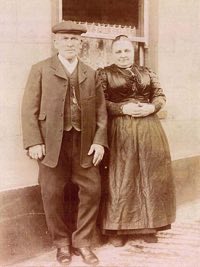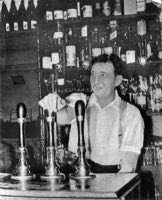
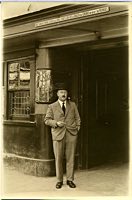 Colourful Innkeepers of Exeter
Colourful Innkeepers of Exeter
Page added 28th February 2018
Today's modern chrome, plastic and velvet cushioned pubs are nol as popular for a night out as they were in the 19th and 20th Century. The modern bar generally has a gaggle of bar staff, overseen by a manager who never seems to be on duty. The mine host of a smaller, traditional pub will often live on the premises with his or her family. What of some of the innkeepers of the past - what type of folk were they?
If you travel back in time, many innkeepers and taverner's would leave the running of the alehouse to their wives and daughters while they did a bit of casual leatherwork or wheeling and dealing in the local market. One family also ran a rope works, now the Bowling Green, while many were also the local blacksmith. Mind you, not all was well back at the hostelry, as records show that a few fines were metered out for brothel keeping!
Run in with the law
Records are hazy about early innkeepers so we have to cycle forward to 1678 when one John Barnes, a former innkeeper of the Black Horse outside the Great South Gate and of good repute, was involved in highway robbery on the Honiton Road. Having run into money difficulties, Barnes 'stood and delivered' the tidy sum of £600 from the Exeter carrier. He was soon apprehended, tried, found guilty, and executed on the 13th August 1678.
John Iley took on the Duke of York, along with his wife in July 1848, and applied for a license. The High Constable asked for references and a week later Iley appeared with testimonials from about a dozen people from Taunton, but not his previous employer – the license was granted on a temporary basis. In the August, an officer of the law, named Superintendent Steele, from Taunton arrived with a warrant for their arrest. When they arrested the couple, and searched the Duke of York, they found a large leather trunk full of items that belonged to their previous employer. It transpired that Mrs Iley was named Rogers and the pair were wanted for robbing their master the Rev. Dr Moysey of Bathalton, Somerset. The were committed to trial at the Somerset Assizes, found guilty and imprisoned for twelve months hard labour.
Longevity
For some, the job of innkeeper becomes their whole life–well a good part anyway. Charles Edwards was born in Exeter during 1830. By 1858 he was running the Port Royal down on St Leonard's Quay. The pub, the longest in Exeter, became under his stewardship, the headquarters of the Exeter Rowing Club. He also ran a boat hiring service from the river bank. His last entry in the trade directories as the innkeeper of the Port Royal was 1923, the year he died, at the age of 93, having been in control of the inn for at least 64 years.
I have found no other innkeepers with such longevity, although several families have been involved in running pubs and hotels in Exeter for several generations. Thomas Pratt ran the Half moon Inn in the High Street during the middle of the 18th Century. He moved to the London Inn before it became the Old London in 1772. Although he died in 1789, his wife and sons ran the Old London Inn until at least 1844–Thomas Pratt, a son or grandson, was then found running the New London Inn from 1850.
It was in 1897, that the Gibbings family took on the Bridge Inn, at Topsham. William John Gibbings was from Clyst St George and is the great-grandfather of the present incumbents. Now, the licensee follows the tradition of promoting local ale and there is always a fine selection available. Apart from the large bar at the back, there is a lovely 'sitting room' at the front of the building with a log fire in the winter. This is much like early country inns, with a serving hatch in the passage to purchase your order. The bridge Inn is the only pub to be visited by HM Queen Elizabeth when she 'popped in' in March 1998.
From Spain to the Black Horse
The Black Horse in Longbrook Street was for many years in the 19th Century run by the same family. Paul Collings was born in Spain around about 1798. He found himself in the British Army, fighting in the Peninsular Wars, and then at the battle of Waterloo. He arrived at Plymouth, friendless, Anglicised his name and found his way to the New London Inn as a stable hand. He had a natural affinity with horses and soon found himself, head coachman. In 1832, he left and took over the Black Horse. He also supplied "Post Horses and Good Carriages, Funeral Carriages etc. to all parts of the Kingdom", and invented a safety brake to prevent wagons and coaches running down hills - ironically his five year old son was killed by a coal cart outside the Black Horse in 1845.
In 1852, Collings opened the Queen's hotel in Queen Street and left the Black Horse in the charge of his son, Paul Collings Jun. Paul Collings owned several properties around the city and was also the Postmaster, employing ten men at Castle Terrace. He died in 1868–the writer of an obituary in Trewman's Exeter Flying Post says that he once asked Paul Collins why he had served England at Waterloo when foreign born. His reply "I have been nursed and bred in Old England, I have thrived under her institutions, I have been protected by her laws, I served when I was a boy in the Waterloo Campaign, and so long as God gives me strength, if the time comes, I will serve her on her own ground". The Black Horse remained in the Collings family until the turn of the beginning of the 20th Century.
Richard Pring was the landlord of the Ship Inn, Martin's Lane from before the Second War to the 1950's. In 1939, Pring, owned a black spaniel called 'Sam' that became well known to the patrons of the Ship. It would greet customers at the door, fetch glasses (they had handles then) and allegedly took glasses of beer to customers seated at the tables (I kid you not - there was a photo taken at the time! honest!). For his trouble, he was often tipped, which he then carried back to his owner. Apparently, the tips went to pay for his dog biscuits. Well they did need some good news during the war.
There were several former Exeter City footballers as mine hosts. The most famous was Cliff Bastin, who played for Exeter City, Arsenal and England in the 1920s and 30s, and ran the Horse and Groom in Heavitree for several years. He spent his final years at 190 Pinhoe Road, Whipton, in the house he lived in as a child and died in 1991 at the age of 79 in the Royal Devon and Exeter Hospital. Exeter City have named one of its stands after him in his honour. The popular City striker, Tony Kellow ran the Eagle Tavern for a time in the 1980s and later, the Clifton Arms. Kellow was the highest scoring Exeter City footballer ever, with 129 goals.
Female proprietors
There have been a few notable female innkeepers through the years. The Royal Clarence was run by Sarah Street from June 1826 until 1860. She refurbished The Hotel by adding the Egyptian Hall, which became a unique selling point in adverts for lectures and other events. The plain Hotel became The Royal Clarence Hotel under her stewardship in 1827, after the Duchess of Clarence (Queen Adelaide) stayed there. It is thought that she was the first proprietor to trade at a profit. Obviously a very good business woman, in what was a man's world.
Miss Sarah Summer lived at the Red Cow and worked at the Elmfield Hotel, now the Jolly Porter, as manager between 1886 and 1906. Her census records indicate a certain, shall we say, stretching of the truth. Her age is given as 42 in 1871, 30 in 1881, 60 in 1891 and 73 in 1901. Just shows you can't rely on the records.
There have been thousands of landlords over the centuries, and the above mentions just a few. Will the modern pub manager be remembered in the same way, a hundred years from now?
Sources: British Newspaper Archive. Family research into Paul Collings by Shirley Collings McBrien.
│ Top of Page │
